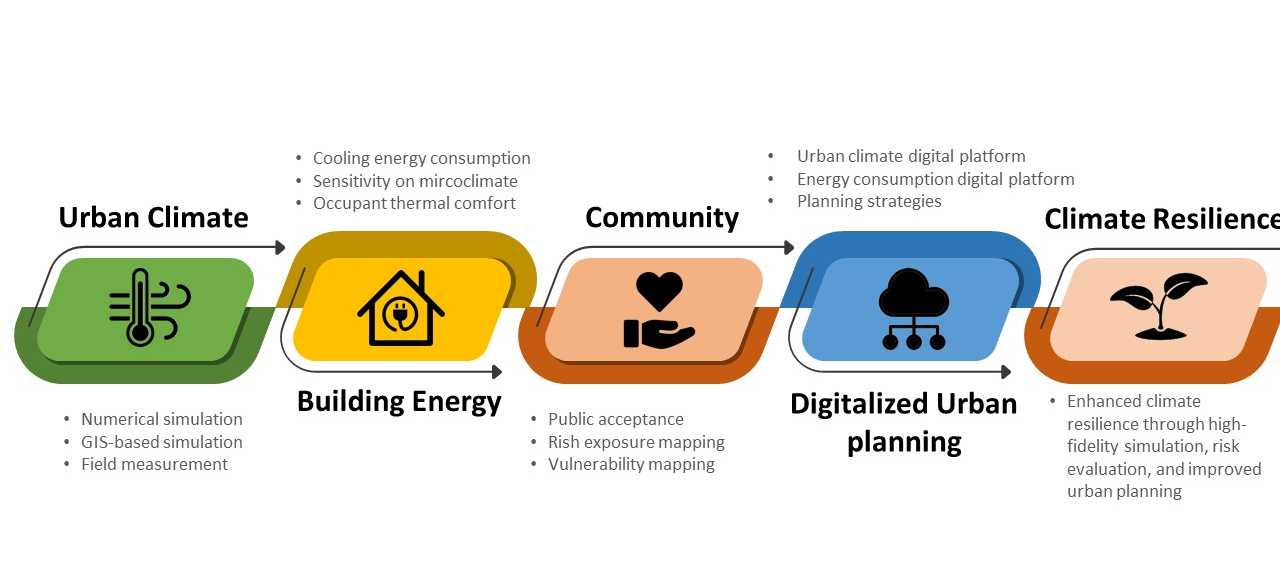Urban Climate Resilience
This module aims to promote the design of climate resilient buildings in a changing urban environment. In this context, resilience may be defined as the ability of being comfortable, healthy and guaranteeing at the same time a high building performance and sustainability considering the coupling effect of climate change, densification, and the urban heat island effect.
First, research will focus on investigating the coupling effect of urban densification and climate change on the urban microclimate. High-fidelity numerical simulations and field measurements will be conducted.
Second, to evaluate the climate resilience of buildings in the city, outdoor and indoor thermal comfort/air quality and building performance will be assessed based on the climate modelling/measurement results.
Third, the impact of urban heat and air pollutant on health and inhabitant behaviour at community level will be evaluated by conducting survey studies. All the data, including urban morphology, environmental quality, building performance (cooling energy consumption), and health, will be integrated into an urban digital twin, which will be applied to visualise the impact on climate resilience of buildings in the city, and used as a planning/design tool.
At the same time, based on a better understanding of the impact of urban planning/design on building climate resilience, planning/design guidelines will be provided. The approach is multiscale, ranging over city (10km), neighbourhood (1km), building (100m) and human scale (10-1m).
The main research objectives of the module are:
- Better understanding of air pollutant dispersion in urban neighbourhoods by buoyancy-driven air flow (parametric study).
- Better understanding of the impact of urban design on microclimate and thermal comfort, focusing on urban greenery and densification.
- Better understanding of buoyancy driven heat removal from typical neighbourhoods in Singapore using water tunnel experiments.
- Development of planning/design guidelines for urban heat/pollutant mitigation based on case studies.
- Better understanding of building energy consumption and building occupant thermal comfort at city, neighbourhood, and building levels considering the influence of the urban heat island and climate change.
- Better understanding of the impact of climate scenarios on indoor ventilation and air quality, focusing on community centres/food courts.
- Develop urban digital twin integrating the impact of planning/design decision making on environmental quality, building performance, health, i.e., the climate resilience of buildings in the city, and visualise them within a single digital platform.
- Better understandings of the potential of building integrated solar panels and the impact of solar panels on the urban microclimate.

Expected Outcomes
Researchers in the module are expected to publish 6-9 journal papers based on the proposed research objectives and provide an urban digital twin platform as a planning/design tool. At least 30% of these publications will be joint publications between SEC, NUS and NTU showing the integration of the different topics.
A major outcome will be the urban digital twin integrating the different outcomes by visualisation enabling urban design and planning. Planning/design guidelines will be organised with various government agencies. 2-3 workshops will be organised with government agencies for the following topics: 1) Use of urban digital twin for planning/design; 2) Urban heat/pollutant impact on health and inhabitant behaviour, and possible mitigation measures; 3) Design guidelines and planning tool for urban greenery planning and development.
